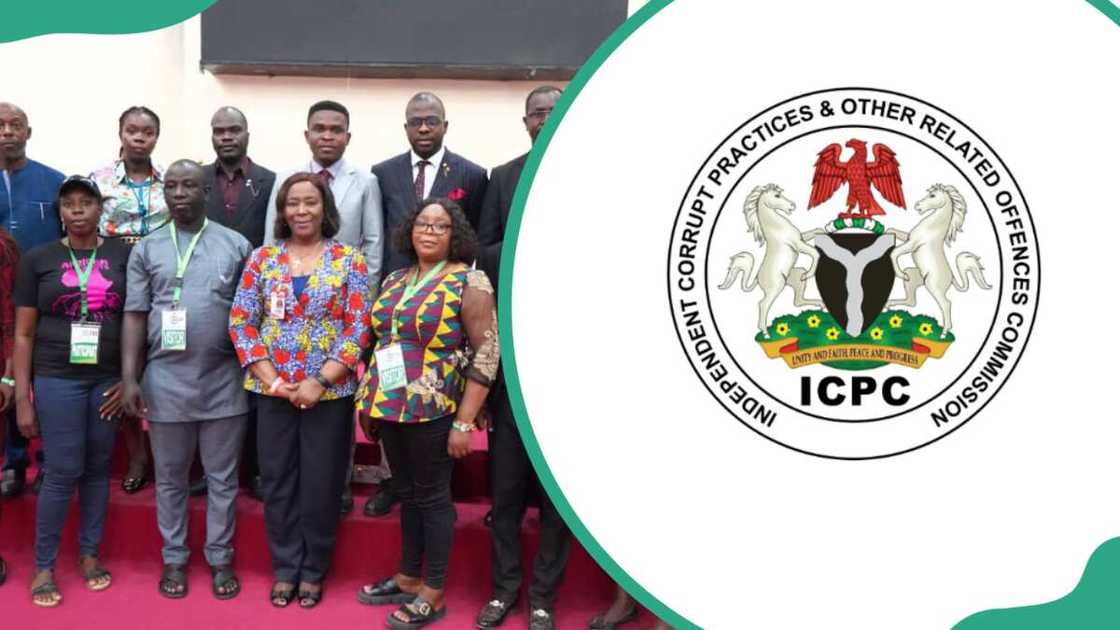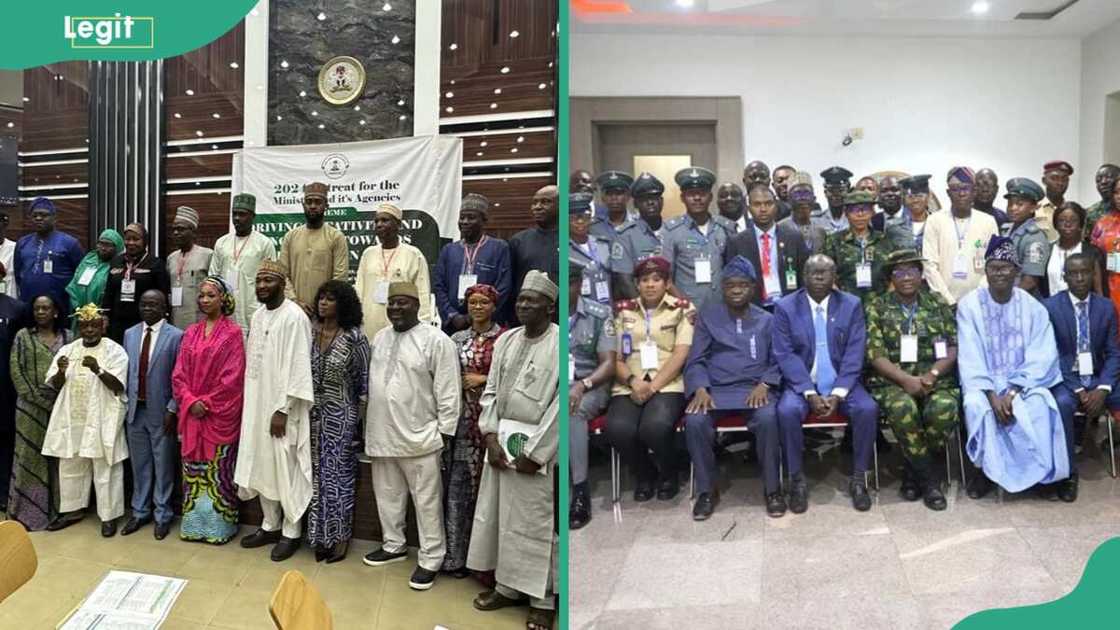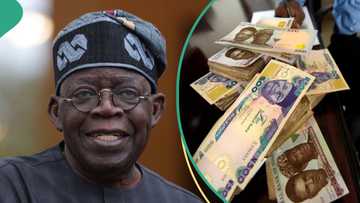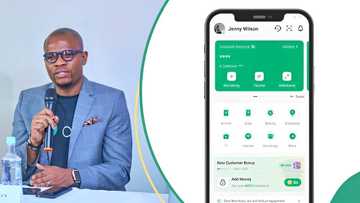Nigeria's ICPC ranks, duties and salaries explained: What does the commission do?
The Independence Corrupt Practices Commission (ICPC) is a paramilitary agency responsible for fighting corruption and related offences in Nigeria. Former President Olusegun Obasanjo inaugurated the agency on 29 September 2000. Since then, the organisation has been at the forefront of enhancing integrity in public service delivery. If you want to join the commission to promote national integrity and equity, here is what you should know about ICPC ranks, salaries, and functions.

Source: UGC
TABLE OF CONTENTS
Fighting corruption has never been easy in Nigeria and worldwide. As a result, former President Olusegun Obasanjo inaugurated ICPC on 29 September 2000. The commission was tasked to fight corruption and other related offences in the country.
ICPC ranks in Nigeria
ICPC in Nigeria has a well-defined hierarchical structure. The structure has three levels, each with officers who perform their duties based on their experience. These include:
| Level | Members |
| Levels 5 to 8 | Entry-level ranks held by junior officers who have just graduated from the ICPC academy |
| Levels 9 to 11 | Mid-level officers with some experience in ICPC operations |
| Levels 12 to 13 | Senior officers with extensive experience in the ICPC |

Read also
Assessing the revolving door: Legality and best practices - by Barrister Yemi Omodele, Ph.D
Section 3 (3) of the 2000 Act states that the commission has a chairman and twelve other members, making it 13 ranks. Two commission members at each rank come from the country's six geopolitical zones.
The commission also has a strict recruitment process, which explains its core purpose of promoting equity. Here is a complete list of ICPC ranks in Nigeria:
1. Chairperson
The chairperson holds the top position and provides strategic leadership and direction to the commission. They also oversee the implementation and formulation of vital policies, ensuring the commission aligns with its core objectives and national priorities.
2. Commissioner
The commissioner is a senior official who runs a specific department or division within the ICPC. Each commissioner oversees critical aspects of the commission, such as investigation, prosecution, intelligence, education, and legal administration. They also formulate strategic policies and guidelines for their departments.
3. Director general
The director general provides leadership and management oversight for ICPC’s operations. They also direct and coordinate the activities of their departments and divisions, ensuring that ICPC functions align with its goals.
4. The director
The director is a senior executive who manages a specific division or unit within ICPC. Like the commissioner, the director coordinates various operations such as investigation, prosecution, intelligence, monitoring, and education of other ICPC officials.
5. Deputy director
The deputy director supports the director in their day-to-day management activities. They also plan, coordinate, execute various departmental activities, and guide their staff members.
6. Assistant director
An assistant director has a vital supportive role in managing the division within the ICPC Nigeria. They also assist the deputy director in implementing policies and strategies, supervising team members, and ensuring effective workflow and productivity.
7. Chief superintendent
The chief superintendent is a senior Independent Corrupt Practices Commission law enforcement officer. They are responsible for investigating cases and preparing case files related to corruption. They also work closely with prosecutors and legal experts against the corrupt.

Source: UGC
8. Superintendent
A superintendent is an experienced investigator who handles complex corruption cases. Their primary responsibility is to conduct thorough probes, interview witnesses, and analyse financial records to uncover corruption or fraudulent activities. They also assist the chief superintendent in preparing prosecution files against offenders.
9. Deputy superintendent
The deputy superintendent supports superintendents in their investigative activities. They also work under other senior officers to contribute to the overall investigation process.
10. Assistant superintendent
Assistant superintendents are among the entry-level ICPC officers who assist in various investigative tasks like information collection, interviews, and report preparation. They also learn and enhance their skills while at work.
11. Inspector
Inspectors are junior officers who assist their seniors in gathering and documenting evidence and conducting fieldwork. They also participate in training programs to enhance their experience in anti-corruption duties.
12. Assistant inspector
As entry-level officers, Assistant Inspectors support Inspectors in administrative activities, data collection, and other operational duties. They learn their anti-corruption skills through training programs or from their seniors.
13. Administrative staff
An administrative staff member holds the lowest rank in the ICPC structure. It consists of entry-level officers who assist in office duties like record-keeping, scheduling, communication, and logistical support.
ICPC ranks and salary
ICPC officials earn their monthly salary based on their grades, educational qualifications, and experience in the structure. For instance, the lowest officer with an SSCE certificate receives about N53,000 monthly, while national diploma and NCE certificate holders can earn about N74,000 monthly.
These salaries are also likely higher when other allowances and remittances are included. Here is a summary of the ICPC ranks and salary:
| Level | Rank | Monthly salary range (Naira) |
| Top-level officers (directorate positions) | ChairpersonCommissioner | 350,000 to 700,000 |
| Senior-level officers (directorate positions) | Director General Director Deputy Director Assistant Director | 200,000 to 350,000 |
| Mid-level officers (inspectorate positions) | Chief superintendent Superintendent Deputy Superintendent Assistant Superintendent | 160,000 to 250,000 |
| Entry-level officers (assistant positions) | Inspector Assistant InspectorAdministrative Staff | 50,000 to 100,000 |
Duties of ICPC in Nigeria
Section 6 of the Establishment Act states that the commission has six primary duties. These include:
- To receive and investigate complaints from the public and prosecute perpetrators.
- To examine the practices, systems, and procedures of public bodies. They also supervise the review of public bodies in case of corruption allegations.
- Instruct, advise, and assist any officer, agency, or parastatal to investigate and minimise corruption cases.
- To advise heads of public bodies on any change in practice, systems, or procedures compatible with their services.
- To educate the public on and against corruption and related offences.
- To enlist and foster public support in fighting against corruption.
ICPC uniform
ICPC does not have a specific uniform for its staff members. Like any other government body, ICPC officials must dress professionally for their roles within the organisation. Their attires include business suits, dress shirts, ties, and formal dresses or traditional clothes for women.
What does ICPC mean in Nigeria?
The full meaning of ICPC in Nigeria is Independent Corrupt Practices and Other Related Offences Commission. The federal agency was set up to fight corruption, which had reached a tragic level in Nigeria before former President Olusegun Obasanjo took over.
Who is the current secretary of ICPC?
Mr. Clifford Okwudiri Oparaodu is the current secretary of ICPC Nigeria. He was appointed by President Bola Ahmed Tinubu on 17 October 2023 and assumed office on 31 October 2023 after a smooth transition from Professor Musa Usman Abubakar.
Who is the leader of the ICPC?
Dr. Musa Adamu Aliyu is the leader or chairman of the ICPC. He was appointed by the president on 17 October 2023 and sworn into office on 13 December 2023.
Are you ready to join ICPC but need to know which position to apply for? The first step is understanding ICPC ranks, requirements, and salaries. The article has covered the critical aspects of this anti-corruption agency.

Read also
New set of billionaires to join Dangote, Alakija, others as FG begins 2024 oil block bid round
DISCLAIMER: This article is not sponsored by any third party. It is intended for general informational purposes only and does not address individual circumstances. It is not a substitute for professional advice or help and should not be relied on to make decisions of any kind. Any action you take upon the information presented in this article is strictly at your own risk and responsibility!
Legit.ng recently published an article about the Nigerian police ranks, symbols, duties and salaries. The NPF (Nigeria Police Force) is Nigeria's primary security and law enforcement agency.
As with numerous other law enforcement and security agencies, the NPF has an elaborate hierarchical structure that starts with the Inspector-General at the helm. Learn more about the hierarchy of police ranking in Nigeria and the symbols associated with each rank.
Source: Legit.ng







